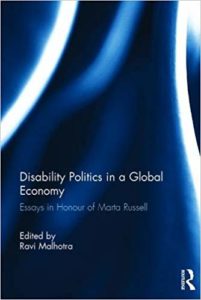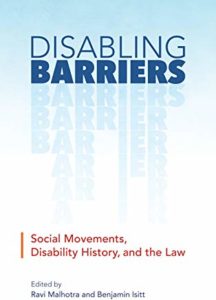By: Ravi Malhotra
Routledge, 2017
By: Ravi Malhotra and Benjamin Isitt
University of British Columbia Press, 2017
 The modern concept of disability—indeed, the conception of disability itself, as there was no identical concept before modern times—is a by-product of capitalism. Capitalism spawns disability both as the primary producer of impairment (through industrial workplace accidents, the physical and emotional toll of exploitation, and the effects of widespread toxic contamination on congenital development) and as its conceptual primogenitor.
The modern concept of disability—indeed, the conception of disability itself, as there was no identical concept before modern times—is a by-product of capitalism. Capitalism spawns disability both as the primary producer of impairment (through industrial workplace accidents, the physical and emotional toll of exploitation, and the effects of widespread toxic contamination on congenital development) and as its conceptual primogenitor.
Yet there is a distressing dearth of scholarship at the intersection of socialist theory and critical disability theory. Some critical disability scholars, but not enough, draw out the historical materialist underpinnings of disability. Even fewer socialist theorists have examined how recognizing the relationship between capitalism and able-ism increases our understanding of both.
Ravi Malhotra and Benjamin Isitt have contributed to closing this gap with two anthologies: Disability Politics in a Global Economy (henceforth DPGE) and Disabling Barriers (henceforth DB).
The concept of normalcy, which arose in the late 1800s, is only definable in the negative: It is impossible to specify a meaning for “normal” beyond “that which is not abnormal.” The conceptual and political work is done by creating a refuse heap of abnormality—for which disability is just another term—and throwing everything into it until “normal” has been whittled down to serve the functions for which it is required.
But what are those functions? Who benefits? Marta Russell, one of the most influential scholars to combine critical disability theory and socialist theory, posed the question “Whom does the concept of ‘normal’ serve?” (my paraphrasing) and argued, incontrovertibly, that the answer is “capitalism.”
Fundamentally, what “disabled” means in the modern era—that is, within and under capitalism—is to be unfit for work: to be a worker who is unable to sell their1 labor. As Russell has argued (including in the essay that Malhotra added as an appendix in DPGE), the social expendability of and lack of supports for people whose labor is not marketable shores up capitalist extraction of profit by using fear of destitution as a means to drive workers to accept exploitative work conditions (DPGE, 234). To be clear, disabled workers are unable to sell their labor not because they are unable to engage in work at all, but because for them to do so would require various accommodations. Because employers perceive accommodations as a decrease in worker efficiency or as an increase in the cost associated with employing them, disabled workers are viewed by employers as undesirable so long as there are workers available who do not require accommodations. Further, the case can readily be made that capitalism uses the concept of disability—similarly to the use of gender and race—to drive a wedge between workers. For “able-bodied” workers who fail to reflect on the contingent and transient nature of their status, the rejection of disabled workers can appear, superficially, as a welcome reduction in competition for work.
 Furthermore, important scholarship details the creation and expansion of an “industrial care complex” in the modern era in which disabled bodies become commodities that generate vast profits for health care and service providers such as the nursing home industry. And emotionally impaired bodies are fuel for the mass carceral state and its industries: In the United States, the carceral system is the largest provider of mental health treatment for poor people (Liat Ben-Moshe and Jean Stewart, “Disablement, Prison and Historical Segregation: 15 Years Later,” in DPGE, Chapter 5).
Furthermore, important scholarship details the creation and expansion of an “industrial care complex” in the modern era in which disabled bodies become commodities that generate vast profits for health care and service providers such as the nursing home industry. And emotionally impaired bodies are fuel for the mass carceral state and its industries: In the United States, the carceral system is the largest provider of mental health treatment for poor people (Liat Ben-Moshe and Jean Stewart, “Disablement, Prison and Historical Segregation: 15 Years Later,” in DPGE, Chapter 5).
These are reasons why socialist theory is incomplete unless it engages with the role of disability in capitalism. But critical disability theory is similarly doomed to incompleteness if it does not engage with the role of capitalism in disability.
Socialist theorists, regardless of nuances of interpretation, share a common understanding that in a capitalist political economy, work—both the availability of jobs (the opportunity to earn money from one’s labor) and the act of labor itself—exists for the benefit of the employer rather than the employee. Advocacy for or discussion of disability rights in the workplace that is not grounded in socialist theory, however, falls short because it sneaks in the presumption of, or the aspiration to, a view of work as existing for the benefit of workers. Notions of a “right to work” for disabled people, or of a “right to accommodations” that enable them to make use of their productive capacities, are fundamentally at odds with the structure of capitalism. In capitalism, no one has a “right to work.” No one has a right to either the emotional or financial benefits associated with using their capabilities to make a social contribution. You get that opportunity only if employers want to purchase your labor in the marketplace. And what it means to be disabled is that you have been deemed unfit to work by employers in that marketplace.
This conundrum is made apparent in various papers in both volumes. For example Matthew Smith, in “The Duty to Accommodate Drug and Alcohol Addiction in the Workplace” (DPGE, Chapter 4), argues for workplace accommodations that take into account the difficulties faced by workers who are recovering from addictions. These include the likelihood of relapses and the need for subsequent rehabilitation after an initial rehabilitation has enabled them to return to work. The enlightened and supportive approach that he advocates pushes back against the very core of capitalism. It can certainly be dressed in “capitalist-aspirational” language of retaining excellent employees who struggle with addiction, but the reality is, why would an employer bother unless forced by law? They would not when there are any number of equally excellent, addiction-free potential employees out there begging to be exploited in the same job. And such laws will not be enacted within a capitalist political economy in the way that Smith advocates, because they challenge the very structure of capitalism. The policies Smith advocates require a structure in which people are entitled to work. Smith does not connect these dots in this paper, but by examining the accommodation of addictions in the workplace and by arguing that being in recovery from an addiction does not make a person unfit for work, he sheds light on where socialist theory and critical disability theory need to come together.
Two of the papers included are examples of a more fully intersectional theory: Zach Richter’s “Autonomism and the Disabled and Abled Working Classes” (DPGE, Chapter 9) and Eric Tucker’s “Compensating Work-Related Disability” (DB, Chapter 9). Both authors situate their arguments within specific versions of socialist analysis rather than glossing over such nuances.
Although the majority of the papers in these anthologies are not based equally in socialist theory and critical disability theory, they are an invaluable step in the right direction. Critical disability studies and socialist studies are both marginalized in academia, which is an obstacle to bringing the fields together. By creating a space for their contributors to publish, Malhotra and Isitt are doing their part to push against that barrier.
Sunaura Taylor argues that we have the right not to have our value determined by our productivity as workers,2 and I agree. I would build upon that, however, to argue that in a just world, “disabled worker” would no longer be an oxymoron. When a community or society dismisses or refuses the participation of its disabled members, it throws them out—it throws them away. But in a just world, no human being is refuse.
notes
- My use of their as a gender-neutral, singular pronoun is intentional.
- Sunaura Taylor, “The Right Not to Work: Power and Disability,” Monthly Review (Vol. 55, Iss. 10, March 2004), 30-44.


[…] This was originally published in New Politics Vol. XVIII No. 3, Whole Number 67. […]